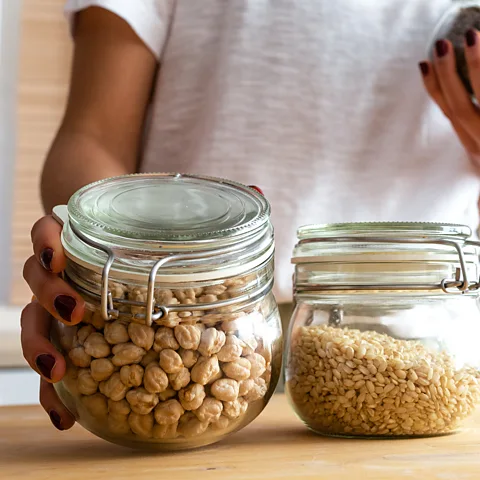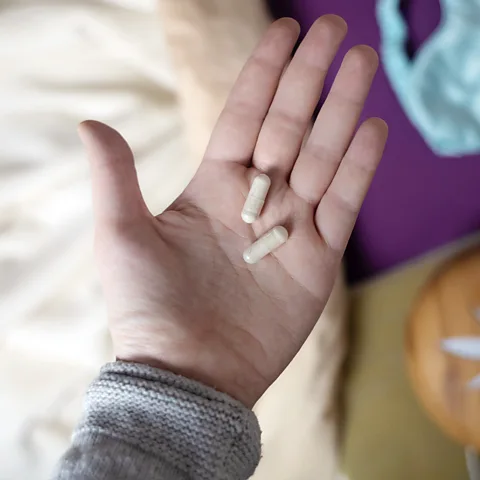
Better Sleep?: See The List of Surprising Foods That Lead to Better Sleep
- Published By The Statesman For The Statesman Digital
- 2 weeks ago
Most of us know going to bed on a full stomach can affect our sleep. Changing what we eat and the time of day we eat certain foods can help us sleep better.
We've all woken up the morning after a large, late night meal feeling tired out. The extra energy required to digest big portions of rich food can eat into our kip, leading to a disturbed night's sleep.
Thankfully, there are also ways we can try to improve our sleep through our diet by avoiding certain foods and drinks known to keep us awake, such as those containing caffeine. But can we also eat other foods – particularly before we go to bed – to boost the quality of our sleep further?
Food or diet?
Several studies have narrowed in on certain suppers that could improve our sleep. Some small trials have found that tart cherry juice, for example, can help people sleep better, and others find that eating kiwifruit before bed is beneficial. There's also some research showing that warm milk can help us sleep. It is thought the high levels of tryptophan – from which the "sleep hormone" melatonin is synthesised by the body – in milk may help to induce sleep onset.
Melatonin regulates our sleep/ wake cycle. Our bodies produce more of it later in the day, when it starts to get dark. But we can also get melatonin directly from foods, including eggs, fish, nuts and seeds.
 Getty Images
Getty ImagesNumerous studies have found that eating melatonin-rich foods can improve sleep quality, and help us sleep for longer. But there's also a lot of research to suggest that any one particular food or drink is not enough to improve sleep – and it's our overall diet that matters.
"You can't eat poorly all day long and think that it's enough to have a glass of tart cherry juice before bedtime," says Marie-Pierre St-Onge, a professor of nutritional medicine at Columbia University Institute of Human Nutrition in New York.
This is because extracting the nutrients from food that the body can use to produce neurochemicals that promote sleep doesn't happen within a couple of hours, she says.
Instead, it's what we eat throughout the day that can improve sleep quality.
What type of diet best promotes sleep?
Research shows that the most beneficial diet for sleep seems to be a plant-based diet that includes lots of wholegrains, dairy and lean proteins including fish, says Erica Jansen, assistant professor of nutritional sciences at the University of Michigan in the US.
In her 2021 study looking at the relationship between sleep and diet, Jansen found that people who started eating more fruit and vegetables every day over a period of three months can dramatically improve their sleep.
More than 1,000 participants were tasked with increasing their daily intake of fruit and vegetables. This increase was to tease apart the two-way relationship between sleep and diet that besets research in this area – population studies could show people with healthier diets have better sleep, but there's always the chance they make better choices with food because they're better rested.
Jansen found that women were more than twice as likely to experience an improvement in insomnia symptoms after eating an extra three or more servings of fruit and vegetables a day.
One reason for this is that fruit and vegetables (along with meat, dairy, nuts, seeds, wholegrains and legumes) are generally high in the essential amino acid tryptophan.
In a 2024 study in Spain, more than 11,000 students were asked about their sleep habits and diet. It found that the quartile that consumed the least tryptophan on a daily basis had significantly worse sleep outcomes. The researcher conclude that low tryptophan intake was linked to a higher risk of short sleep duration and greater risk of insomnia. Eating foods containing more tryptophan may improve sleep quality, they suggest.
The reason tryptophan is important, Jansen says, is because it's a precursor of serotonin, which then gets converted into melatonin.
 Getty Images
Getty Images"If the body doesn't have tryptophan, or direct sources of melatonin from food, the levels of melatonin produced by the body will be reduced," she says.
But it isn't just as simple as eating tryptophan-rich foods, she adds. It needs to be eaten with a high-fibre carbohydrate, such as a wholegrain or legume. This allows it to be digested properly and make its way to the brain, from where it can improve sleep.
There are many other ways that a plant-rich diet may improve sleep, too. Diets high in plant foods are known to reduce inflammation in the body, for example, and some research suggests that lower levels of inflammation are associated with better sleep quality.
In her research, St-Onge has found that improved sleep is associated with diets high in fibre, which plays a crucial role in bacterial fermentation in our guts. Studies shows that there are numerous possible beneficial mechanisms that can explain why a healthy gut can improve sleep, via the gut-brain axis.
There are also animal studies showing a connection between improved sleep and intake of the beneficial plant compounds polyphenols. However, St-Onge says, it's difficult to evaluate this in human studies because databases showing the polyphenol content of different food – which would be used to measure how much a person consumes – can't be entirely accurate.
This is because the amount of polyphenols in food varies from crop to crop, year to year, depending on soil type, weather conditions and farming processes. This is the same for the amount of melatonin in plant-based foods, which also may differ depending on how and where it was grown.
How helpful is magnesium?
Magnesium is another nutrient found in plant-rich diets that may be conducive to a good night sleep. This is because it can help to reduce the stress hormone cortisol, which calms the nervous system.
It's recommended most adults over 30 consume around 420mg of magnesium per day. It can be found in many foods, including green leafy vegetables, such as spinach, as well as legumes, nuts, seeds and wholegrains.
 Getty Images
Getty ImagesHowever, many people are lacking this nutrient. Experts say this is partly because of the Western diet (low in plants, high in ultra-processed foods), and partly because intensive farming practices reduce the amount of magnesium in the soil crops grow in. (Learn more about how processed foods became so unhealthy.)
In her 2024 study, Heather Hausenblas, a professor of exercise science at Jacksonville University in Florida in the US, tested the effects of increased magnesium intake on people who reported being poor sleepers.
For two weeks, they took magnesium supplements one hour before bed while during another two week period they took a placebo pill. Their sleep was measured through a body-worn tracker and they also reported on how well they felt they'd slept.
Hausenblas found that the participants' deep and REM sleep improved more when they took magnesium, compared to taking the placebo. She suspects this effect would last longer than two weeks, but she can't say for certain.
However, while she says a good quality magnesium supplement could help people sleep better, Hausenblas says it isn't a cure-all.
"Just taking this before bed won't cure you of all sleep issues if don't get outside and exercise, eat lots of ultra-processed food and if you don't have a consistent sleep-wake cycle," she says.
Another reason why magnesium could improve sleep is because of its potential benefits to mental health. Research has found that poor sleep and depression, for example, are closely connected.
One study from 2017 found that a daily magnesium supplement led to a significant improvement in depression and anxiety, regardless of the person's age, gender or the severity of their depression.
More widely, research also shows that a diet high in fruit and vegetables can improve symptoms of depression.
Can how we eat have an effect?
While researchers agree that one carefully selected supper isn't enough to save us from a night of bad sleep, there may be something we can do about the timing of our meals throughout the day.
"One of the most important things before sleep is to stop eating a few hours before bed, especially not having the biggest bulk of calories before bed," says Jansen.
There is a small body of research suggesting that having meals earlier in the day, starting with breakfast, is associated with better sleep quality. Research suggests that eating your last meal closer to bedtime can increase the time it takes you to fall asleep.
This may be partially because it makes it easier for us to associate eating with the daytime, and nighttime with sleeping, says Jansen.
"When you have a clearer separation between day and night, the brain has an easier time recognising that it's time for sleep," she says. "The brain starts fresh every morning, and light exposure early in the morning is important for resetting our body clock."
 Getty Images
Getty Images"Eating time cues are another way of telling our body what time it is," Jansen says. "The body feels functions best when we're doing the same things at the same time every day."
And when you do eat breakfast, bear in mind that one study found that eating a dairy-rich breakfast in bright daylight may be more beneficial to sleep than eating it in a dimly lit room. This is because, researchers say, eating in the daylight allows our bodies to produce more melatonin, the hormone that helps us sleep at night.
Read Also: Your Lungs Hold Secrets About Your Health As You Age: Here's a Simple Test to Check Them
However, St-Onge says, scientists haven't produced any definitive answers yet on whether melatonin we might obtain from plants influences the melatonin our bodies produce, and how this might influence our sleep.
"Also, is our metabolism impacted by what we eat? This could be relevant for sleep. We need to dig further into those mechanisms," she says.
Jansen agrees that this is a difficult area of research, with several unanswered questions, including the amount of melatonin we need in our diets for it to have an effect on sleep.
"It's difficult to study whether light is a bigger influence on melatonin than diet, or if they work together," she says.
Optimising our diet for sleep
It seems that a plant-rich diet is the most beneficial for sleep, for numerous reasons – and that eating at consistent times throughout the day – for those who can – may also help.
But our diet doesn't exist in a vacuum, and researchers stress that our sleep is also influenced by how much we move in the day, our mental health, and our exposure to light and darkness.
Also, St-Onge says, it's important to distinguish between poor sleep, and a sleep disorder, such as insomnia or sleep apnoea.
"If you have a sleep disorder, you need to get tested and treated," says St-Onge. "Part of the treatment plan could be improving your diet, but some people will need something in addition to that."
Share on
SHARE YOUR COMMENT
MORE STORIES FOR YOU
Trending Stories
DJ Mo’s former illicit lo...
- Published By Jane
- January 15, 2024
Mapenzi! Zari and Tanasha...
- Published By Jane
- October 24, 2023
Zuchu Speaks on Diamond P...
- Published By Jane
- October 12, 2023
Hio Ni Upumbavu Wasituche...
- Published By Jane
- November 8, 2023
RECOMMENDED FOR YOU
Your Lungs Hold Secrets A...
- Published By The
- September 11, 2025
Better Sleep?: See The Li...
- Published By The
- September 11, 2025
What to Know About iPhone...
- Published By The
- September 11, 2025
From Teacher to Mwalimu N...
- Published By The
- September 11, 2025
Latest Stories
"Hakuwa Type Yangu": Geor...
- Published By The
- September 30, 2025
How to Have a Baby Boy: K...
- Published By The
- September 30, 2025
"God is Good": Zari Hassa...
- Published By The
- September 30, 2025
Madagascar President Diss...
- Published By The
- September 30, 2025



